Call me a sap but when it comes to the 4th of July, I always get a little emotional. Thing is, when I was 18 years old in 1976, living during what so many of us recall as “revolutionary” times with the closing chapter of a disturbing war in Vietnam and all that era represented – anti-war protests; the drugs, sex, rock ‘n’ roll counter culture; the generational divide that effected my and so many other families – a birthday party, the likes of which no one had ever seen befo re, brought my family, my town, our land “from sea to shining sea” back together again. If only for a weekend.
re, brought my family, my town, our land “from sea to shining sea” back together again. If only for a weekend.
Despite all the things I hated about my country at the ripe old age of 18, the war being chief among them followed by persistent racial and gender inequality followed by the war waged by humans against the environment followed by a deep distrust of government in the wake of Watergate, despite all these transgressions, I felt a deep and abiding love – reverence, really – for the ideals the Founding Fathers built this nation upon. Life, liberty, and the pursuit of happiness. When I realized I was “coming of age” on the 200th birthday year of the United States of America, I thought it no accident. It was destiny and I owned it.
When not hooking school, coming in late with a hangover, being expelled for smoking in the bathroom, or otherwise taking advantage of other pursuits of happiness, I spent quality time contemplating solutions to global issues in a self-directed independent study for honors students my senior year. Like most hippies of a certain ilk, I embraced vegetarianism. Still, “not eating meat for humane reasons alone doesn’t seem reason enough on a practical level when arguing on behalf of vegetarianism,” I wrote, “as there will always be those for whom such sentimentality matters not.”

Poring through “hard copy” university research journals and noted periodicals of the day in the high school library including abstracts from the World Food Council of the United Nations – I was a “closet” research nerd without the pocket protector – I was horrified to learn of the devastation that corn-based industrial agricultural had on the soil and all in an effort to sustain the meat industry. We’re talking millions of acres of feed corn – corn that only livestock can eat – which depletes the soil of nitrogen and other valuable nutrients which farmers try to replace with synthetic fertilizers and protect from insects with synthetic pesticides that destroy way more than the beneficial soil dwelling organisms like worms, nematodes, and protozoa. The “run off” after a healthy downpour ends up in streams and rivers and eventually the ocean; polluting everything in its path, killing fish and decreasing oxygen levels in water. In short, turning the delicate balance of nature on its head.
Needless to say, connecting the last dot left a lasting impression. It went something like this: ‘If this cycle is ultimately unsustainable because the soil can’t withstand the offense or the food it provides is nutritionally lacking, how are people going to survive when the world population is estimated to double from the 3 billion of today?’ I didn’t hesitate to debate the virtues of vegetarianism at any/all opportunity including the family dinner table (which prompted me to leave home temporarily for a nearby commune.)
Only one problem. As much as I was convinced of the humane and practical reasons to stop eating meat, I couldn’t stop eating meat. Sure, I could go for a couple months without it but that primordial urge would kick in and tap-tap-tap on my shoulder like a toothache that wouldn’t quit.
I’ve come to the conclusion that life is about revolution, not evolution. Somebody somewhere is always radically changing the way we do the ordinary; shaking things up and our understanding of the universe. Ourselves included. Even if it means revolving full-circle to a previous held notion we now see in a new light.
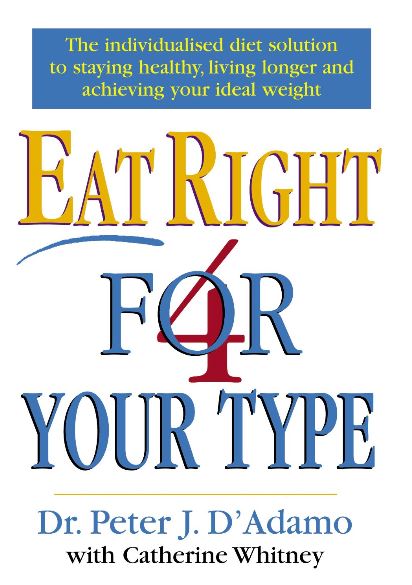 Such was my vegetarian/carnivore dilemma. My propensity towards anemia, I see in retrospect, most certainly accounts for the carnivore craving, as does my blood type, O, which, according to Dr. Peter J. D’Adamo, author of the controversial book, Eat Right 4 Your Type, (Riverhead, paperback) ought to focus “. . . on lean, organic meats, vegetables and fruits and avoid wheat and dairy, which can be triggers for digestive and health issues.”
Such was my vegetarian/carnivore dilemma. My propensity towards anemia, I see in retrospect, most certainly accounts for the carnivore craving, as does my blood type, O, which, according to Dr. Peter J. D’Adamo, author of the controversial book, Eat Right 4 Your Type, (Riverhead, paperback) ought to focus “. . . on lean, organic meats, vegetables and fruits and avoid wheat and dairy, which can be triggers for digestive and health issues.”
But in all these years since my independent study experience, I’ve wrestled not so much with the guilt of eating meat, but with the guilt of eating meat that’s been corn-fed knowing the terrible price on the environment. Even on organic farms to some extent. Until now.
For those who jumped on the “grass-fed” bandwagon ahead of me, I’m a little late to this revolution, but glad to join their ranks. If you live in the greater Manchester area, one of the most progressive “thinkers” in the movement is Steve Normanton of Litchfield, whose farm on Charles Bancroft Highway bears his name and who has been producing pastured, grass-fed beef, pigs, and poultry since 2009 (stevenormanton.com). A native of South Africa, the handsome, rugged, 40-something farmer has a fetish – “obsession” isn’t strong enough – for topsoil and a mind like an encyclopedia when it comes to ecosystems.
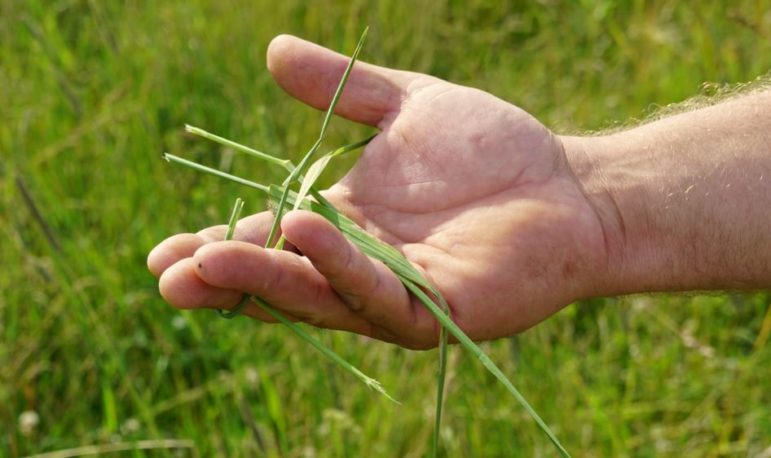
On a recent visit with Normanton, I was treated to a “foreigner’s” eloquent rendition of America’s glory days, when bison roamed her mid-west prairies in what can only be described as a holistic symbiotic dance of nature. The bison eating and expelling the prairie grass, the nutrients returning to the soil, the root systems decomposing and nourishing microbial life, the dormant seeds sprouting as new life once again. When he told me that topsoil depths of 16 to 18 feet were typical for that area in that era I felt my jaw drop and my heart sink. What’s become of us in this mega-industrial farm age where the soil is dead as sand and nary a nutrient passes through to those synthetic tomatoes, peppers, and strawberries?
Same with meat, Normanton tells me. He drives us to a pasture outside of Concord that I like to think is reminiscent of South Dakota. It is wide and green with grass up to my shin and grazing placidly are all kinds of small, compact beef cows. Swallows dart in and out looking for their requisite lunch of insects. Peaceful simplicity. Looks are deceiving.
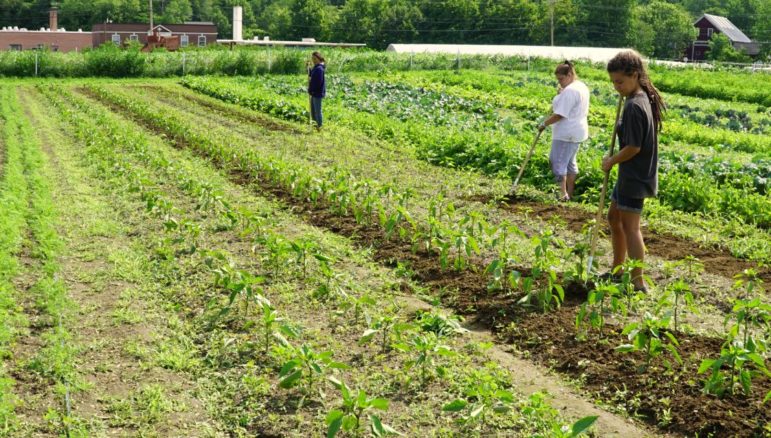
Normanton shows me four parallel pastures divided by an electric strand. The first three pastures are in various stages of “recovery” from recent grazing but all four pastures have all-important priorities: build up the soil to maintain a healthy ecosystem which will ultimately provide the most nutritious pasture grass for the livestock, which will give consumers the most healthy, nutrient rich, omega-3 meat. This is complex stuff, really.
By now, most of us know the “good guy/bad guy” scenario of omega-3 vs. omega-6. Salmon, long the “poster child” of good omega-3 fatty acids for cardiac protection, regulating cholesterol triglyceride levels, anti-inflammatory properties, and other health bennies, doesn’t necessarily have a monopoly anymore. While it’s true that most meat on the market, being corn or grain fed, is largely omega-6 in composition and therefore increases the risk of cardiovascular disease, cancer, inflammatory, and autoimmune disease, the take home message here is that pastured, grass-fed meat and poultry is high in omega-3s. And no guilt.
“We need to eat responsibly,” Normanton tells me with furrowed brow as he surveys the herd. “I mean, look at this scene. These animals are doing what they were bred for in the best environment and care. They roam at will to their heart’s content, eat when they want, and without a care. It’s how it should be done, not packed in a concentrated lot eating bad food and where disease thrives. This is what consumers have to demand from the market for themselves and world.”
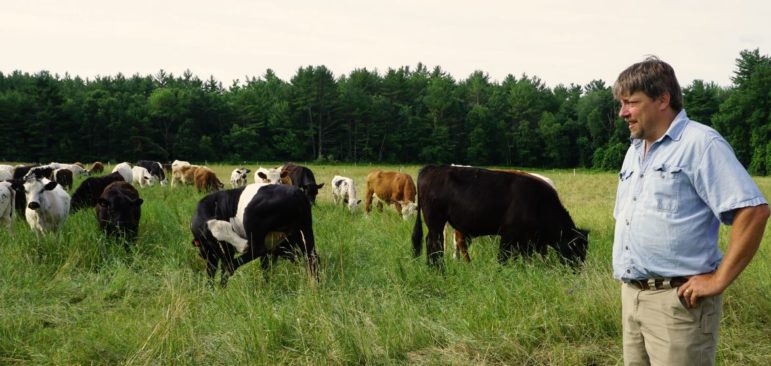
I ask Normanton if he’s upset about the international trade vote 300-131 in the U.S. House on June 10 to remove labels on meat in the U.S. showing place of origin as lobbied for by Canada and Mexico. (NH 1st Congressional District Rep. Frank Guinta (R) voted to remove labels; NH 2nd Congressional District Rep. Annie Kuster (D), voted to keep them.)
“You bet I am!” he barks, visibly shaken. “After all we’ve done and invested to be the kind of conscientious farmer this country needs and to have it all jeopardized with artificial prices that will hurt small farmers like me? It’s very upsetting!”
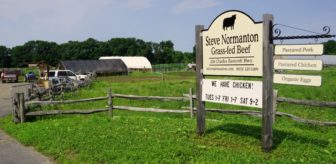 Normanton says he hears the same sentiment from small farmers near and far but especially New England, where small farms of 50 acres or less are booming and where there are more farmer’s markets than anywhere else in the country. He reflects on his own growth since taking over the Litchfield farm in 2009. A 233 percent increase in pastured grass-fed beef sales alone. Add that to sales of pastured grass-fed pork, lamb, chicken, organic eggs and a thriving CSA, a member-based, community supported agricultural association for organic vegetables, and he says he hopes to break even for the first time this year.
Normanton says he hears the same sentiment from small farmers near and far but especially New England, where small farms of 50 acres or less are booming and where there are more farmer’s markets than anywhere else in the country. He reflects on his own growth since taking over the Litchfield farm in 2009. A 233 percent increase in pastured grass-fed beef sales alone. Add that to sales of pastured grass-fed pork, lamb, chicken, organic eggs and a thriving CSA, a member-based, community supported agricultural association for organic vegetables, and he says he hopes to break even for the first time this year.
I know the feeling. It’s been 39 years since I had the notion I was chosen by destiny in 1976 and I’m still “revolving.” Coincidentally, I recently found out my paternal great-great-great-great-great-great grandfather, James Tolliver of Virginia, fought in the American Revolution. I’m still fightin’, grandfather, for everything you believed in . . . life, liberty, and the pursuit of happiness. And you can bet grass-fed burgers will be on the grill on the 4th of July.

About The Barking Tomato: Carolyn Choate loves to chew on food. Literally and figuratively. In the kitchen from her garden in Nashua or her favorite market, a restaurant across town or across the globe. When not masticating, Carolyn is likely swilling wine or spirits as neither is far from her heart – or lips. Forget diamonds and Louboutins, she’d rather blow a wad on Pinot Noir and grass-fed filet with fresh sautéed morels. And write about it. You taste the picture: The “Barking Tomato” aspires to push your “foodie” button. Carolyn’s day job is producing local affairs programming for WYCN-CD. You can contact her at crchoate@tv13nashua.com.
Click here to browse The Barking Tomato archives.
 You’re one click away! Sign up for our free eNewsletter and never miss another thing
You’re one click away! Sign up for our free eNewsletter and never miss another thing







